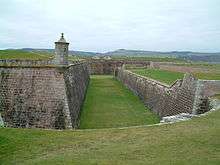Definify.com
Webster 1913 Edition
Fort
Fort
,Webster 1828 Edition
Fort
FORT
,Definition 2026
Fort
Fort
fort
fort
English
Noun
fort (plural forts)
Related terms
Translations
|
|
Anagrams
Catalan
Etymology
From Latin fortis (“strong”).
Adjective
fort m (feminine forta, masculine plural forts, feminine plural fortes)
- strong (forceful, powerful)
- strong (durable, resistant)
- strong (potent, having a high degree of intensity)
Related terms
Adverb
fort
Noun
fort m (plural forts, feminine forta)
Interjection
fort
- Expressing approval of a punishment or misfortune suffered by another.
French
Etymology
From Latin fortis (“strong”). Ultimately from Proto-Indo-European *bʰerǵʰ- (“fort”).
Pronunciation
- IPA(key): /fɔʁ/
Adjective
fort m (feminine singular forte, masculine plural forts, feminine plural fortes)
- strong; powerful
- Arnie est fort. ― Arnie is strong.
- hommes forts ― strong men
- (informal) skilled, proficient, successful, sometimes translated "good" (often used in reference to academic subjects)
- Je suis fort en anglais ― I am good at English
Synonyms
Antonyms
Adverb
fort
- strongly
- much, a lot
- 2001, Le Funambule, page 141, ISBN 2870952465
- Alors on ferme les yeux, on a fort envie de quelque chose et on se l'offre.
- So we close our eyes, we really fancy something and we're going to take it.
- Alors on ferme les yeux, on a fort envie de quelque chose et on se l'offre.
- 2001, Le Funambule, page 141, ISBN 2870952465
- (when preceding an adjective) very (the adjective)
Related terms
Noun
fort m (plural forts)
- A fort
Related terms
German
Etymology
From Middle High German vort, Old High German forth, Proto-Germanic *furþa-, compare English forth, Dutch voort.
Pronunciation
- IPA(key): [fɔɐ̯t]
Adverb
fort
Derived terms
Related terms
Middle French
Adjective
fort m (feminine singular forte, masculine plural fors, feminine plural fortes)
Norman
Etymology
From Old French fort, from Latin fortis, from Proto-Indo-European *bʰerǵʰ-.
Adjective
fort m
Derived terms
- fortement (“strongly”)
Noun
fort m (plural forts)
Norwegian Bokmål
Etymology
From Middle Low German vort
Pronunciation
- IPA(key): /fuʈ/
Adverb
fort (comparative fortere, superlative fortest)
References
- “fort” in The Bokmål Dictionary.
Norwegian Nynorsk
Etymology 1
From Middle Low German.
Pronunciation
- IPA(key): /furt/ (example of pronunciation)
Adjective
fort (indefinite singular fort, definite singular and plural forte, comparative fortare, indefinite superlative fortast, definite superlative fortaste)
Synonyms
- snøgg
Antonyms
Adverb
fort
Synonyms
- snøgt
Antonyms
Etymology 2
From French.
Pronunciation
- IPA(key): /fɔrt/ (example of pronunciation)
Noun
fort n (definite singular fortet, indefinite plural fort, definite plural forta)
Derived terms
- kystfort
References
- “fort” in The Nynorsk Dictionary.
Old French
Etymology
Pronunciation
- IPA(key): /fɔrt/
- Rhymes: -ɔrt
Adjective
fort m (oblique and nominative feminine singular fort or forte)
- strong
- late 12th century, anonymous, La Folie de Tristan d'Oxford, page 354 (of the Champion Classiques edition of Le Roman de Tristan, ISBN 2-7453-0520-4), lines 67-70:
-
La nef ert fort e belle e grande,
bone cum cele k'ert markande.
De plusurs mers chargee esteit,
en Engleterre curre devait.- The ship was strong and beautiful and big,
good like a merchant's ship
loaded with lots of different type of merchandise
ready to set sail to England.
- The ship was strong and beautiful and big,
-
La nef ert fort e belle e grande,
-
Declension
Adverb
fort
Related terms
Old Irish
Pronoun
fort
Descendants
Polish

Etymology
Pronunciation
Noun
fort m inan
- fortress (fortified place)
Declension
Synonyms
- barbakan
- koszary
- twierdza
Related terms
- fortyfikacja
Swedish
Etymology 1
Attested since 1609 according to Nationalencyklopedins Ordbok, from Middle Low German fort (“away, further, forward”), which is used adverbially (forts) with the same meaning in Low German. Related to för ("fore"), före, ("before") and forsla ("transport; carry; haul").
Pronunciation
- IPA(key): /fʊrt/
Adverb
fort
See also
Etymology 2
Attested since 1651 according to Nationalencyklopedins Ordbok. From French fort.
Pronunciation
- IPA(key): /fɔrt/
Noun
fort n
- a fort
Declension
| Inflection of fort | ||||
|---|---|---|---|---|
| Singular | Plural | |||
| Indefinite | Definite | Indefinite | Definite | |
| Nominative | fort | fortet | fort | forten |
| Genitive | forts | fortets | forts | fortens |
Usage notes
- Permanent (stone) fortifications in Europe are called fästning, while fort (and skans) is used for less permanent (earth and wood) structures and for forts in America.